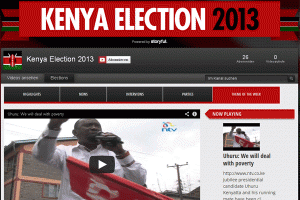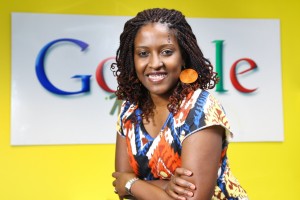How is Google gearing up for the Kenyan elections?
All over the world Google is engaging more and more in covering elections and making access to information easier for voters. This is also true for Africa. Following the elections in Ghana in December last year, Google has launched a new hub for the Kenyan elections coming up on March 4. DW Akademie spoke to Ory Okolloh, Google’s Policy and Government Relations Manager for Sub-Saharan Africa, about Google’s work in Africa and its commitment to free and fair elections.
Africa is still suffering from a big digital divide. How does Google adapt to this?
There are several things that we do as a company to adapt to the digital divide, although it has narrowed considerably over the last few years, there’s still some work to be done. First, on the access side we work on a number of initiatives to help: for instance, connect universities. We have the Google Apps Supporting Programs which includes the deployment of Google Apps but also support universities who are partners with their infrastructure. We also do things like install the Google Global Cashes – we have pretty much covered most countries in Sub-Saharan Africa which allows consumers to access our products much faster by cashing them locally. On the policy side we’re helping different governments to improve and implement broadband policies.
Ultimately, as a private company there’s only so much we can do and the idea is to try and get governments in Africa to treat internet and access to internet as a key component of infrastructure. So infrastructure is not just roads or electricity and water. It’s also access to internet and we’re starting to see progress on that in some countries like Kenya, which is definitely treating technology as a key part of government policy. And Nigeria and Senegal are now working on a broadband policy. So also helping to shape the broader picture is important. Finally, you have to keep in mind that the next billion of people worldwide will probably come online with their mobile phones. We’re trying to optimize this mobile first environment with projects like Gmail-sms .
Gmail SMS brings emails through SMS to simple feature phones – no internet needed. Is that the break-through for rural areas?
I’m not sure it’s a break-through solution. It’s one of many opportunities for people to access our products easier. I’m not convinced that there’s a need to develop specifically for rural areas versus urban areas. I think what needs to happen is make access overall cheaper, make the phones cheaper and people will figure out how to communicate and how to engage with each other. So broadly, I think we don’t speak of rural versus urban area, but in many markets it’s still harder to access our products and enabling things like email via sms is one of the things we try to do to solve that divide.
Google is also putting a lot of resources into elections. You’ve done so for the recent elections in Ghana and you’re also featuring the upcoming elections in Kenya. Why is Google doing this?
 Our election’s work is not just in Africa. We do this work all over the world. It’s part of our mission to make information accessible easily to people around the world. We have found that people during elections increasingly go online to search for information. For instance in Kenya last year the IEBC , which is the Electoral Commission in Kenya, was a top trending search, meaning that people go to the website and try to find information on the elections. This is an observation not only in Kenya; it’s also in the US, in Latin America… it’s across the world. What we’re trying to do through our election work is make that information number one: easy for people to access by aggregating it and bringing it to the surface, and two: we do a lot of work on training around our tools and around digital talk in general for people who are covering the elections. We do training for media and journalists in terms of how can they use Google tools and the internet to improve the election coverage, we work with political parties who are willing to embrace technology to engage with citizens, we think that’s a great trend in Africa as the voting population gets younger. Certainly the campaigns are being forced to go online and engage with citizens in that sense. We’re also engaging with civil society – whether they do advocacy work, whether they’re planning to monitor the elections, or whether they are planning to educate voters, just in terms of how they can use technology to amplify their work. And finally, we follow what’s going on and engage so if you get to voting you’ll know how you can be on top of what’s the latest news and information.
Our election’s work is not just in Africa. We do this work all over the world. It’s part of our mission to make information accessible easily to people around the world. We have found that people during elections increasingly go online to search for information. For instance in Kenya last year the IEBC , which is the Electoral Commission in Kenya, was a top trending search, meaning that people go to the website and try to find information on the elections. This is an observation not only in Kenya; it’s also in the US, in Latin America… it’s across the world. What we’re trying to do through our election work is make that information number one: easy for people to access by aggregating it and bringing it to the surface, and two: we do a lot of work on training around our tools and around digital talk in general for people who are covering the elections. We do training for media and journalists in terms of how can they use Google tools and the internet to improve the election coverage, we work with political parties who are willing to embrace technology to engage with citizens, we think that’s a great trend in Africa as the voting population gets younger. Certainly the campaigns are being forced to go online and engage with citizens in that sense. We’re also engaging with civil society – whether they do advocacy work, whether they’re planning to monitor the elections, or whether they are planning to educate voters, just in terms of how they can use technology to amplify their work. And finally, we follow what’s going on and engage so if you get to voting you’ll know how you can be on top of what’s the latest news and information.
Has Google become an agent of freedom of speech?
The founders have always spoken openly about their believe in free expression and the free movement of information between borders. So, I don’t think Google has become an agent of freedom of speech. I think it’s a value the company respects and takes very seriously.
You’ve already mentioned the training of journalists. You’ve also launched information portals on the Ghanaian as well as on the Kenyan elections. How far are journalism projects becoming strategically more important to Google?
Journalism and media is always going to be important to us, particularly as a company in Africa for a number of reasons. People still consume most of their information with the news, whether it’s radio, newspaper, TV or online and people still look for journalists for the latest information. Two, it’s about local content. We ask ourselves, it’s great that people go online but do they find information that’s meaningful to them? Are they getting local content? And journalists again are a very important medium in shaping the content that is brought online. I think media is looking to sort of grapple with how do you balance offline and online. I think we can offer support in terms of education and sharing experiences so that they can maximize or handle this balance between their offline strategy and their online strategy. One interesting example from a training in Kenya: Recently we saw a journalist, who attended one of our trainings, using a Google map to capture the results of the primaries and no one else was doing this. He was using the skills at hand and the information at hand to present information that then is very useful to people who are trying to follow who has won or lost in the primaries. In Ghana, we integrated Google+ hangouts with radio. So through Google+ radios in Ghana were able to do interviews with people in the diaspora, with people who couldn’t make it to the studio. We also organized hangouts between listeners and politicians. This blend of traditional media and technology demonstrates that you’re able to combine the two to engage with your users or followers. Short answer: Media is very important for us, in our relationship with them. Both in terms of training and support we can offer but also the content is important to us. So that people who come online and search for information find content that’s relevant to them.
So looking at the Kenyan elections again, what influence do you think the internet is going to have on the upcoming elections?
I think it will have a big role. Not necessarily in determining the results. But I think in terms of how people are going to access information and follow the trends – whether it’s on Facebook or Twitter, the elections hub or Youtube. It’s the first time for presidential debates and I’m sure a lot of people can’t get to the TV. They’ll be watching online and looking at the video on Youtube. So, I think the internet will be influential in terms of engagement and following the information. Many more Kenyans are online now than 2007 and some of the gaps that we saw in 2007 will be much harder to happen in 2013.
Interview: Christine Harjes





Feedback